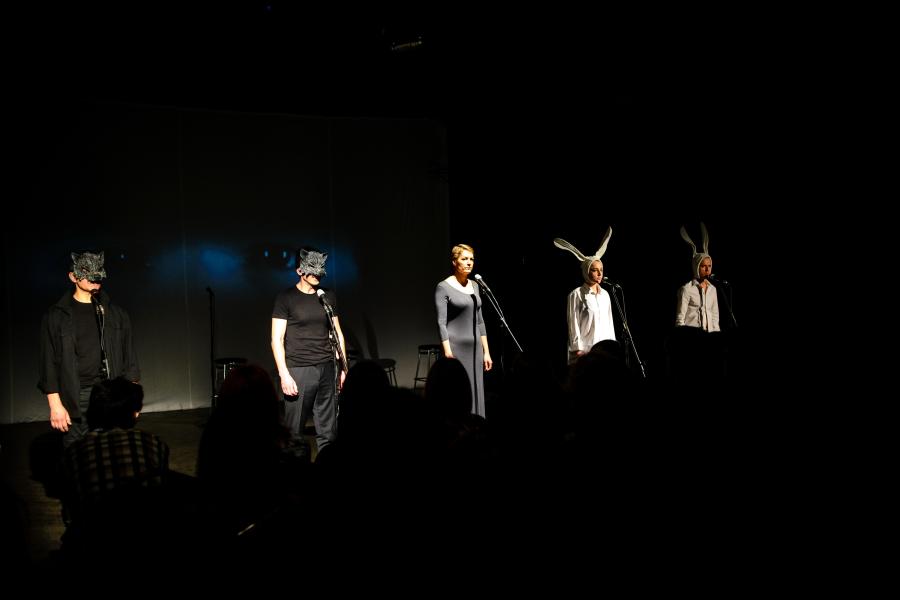On Safer Internet Day, students, teachers and parents learned about online violence through theatre
13 February 2020
In the upcoming months, the Eminescu Theatre will host a series of open lessons about online violence, including cyberbullying, data privacy and inappropriate content online. Teachers, parents, psychologists, as well as 12th-grade students, will be invited to view the documentary theatre performance „Corp de Copil“ performed by Centrul de Arte Coliseum and participate in the following expert-led discussion.

Aligned with the #ENDviolence in and around Schools campaign’s objectives to reduce the acceptance of bullying and empower young people and parents to take a stand, the initiative is launched in the context of Safer Internet Day held this year on February 11. On this globally celebrated day, the intention of the initiative is to promote the safer and more responsible use of online technology and mobile phones by children and young people across the world.
A 2019 U-Report poll conducted in 30 countries, with responses from over 170,000 young people, found that 1 in 3 young people have experienced cyberbullying, and 1 in 5 of those who responded had stopped going to school on occasion because of online bullying.
"Today we are launching a new initiative that will help us address the issue of online violence," said Angela Prisăcaru, senior consultant at the Ministry of Education, Culture, and Research. "The Internet is not only part of our life, but also of every student, whether socializing with friends, doing homework, listening to music, developing a hobby or watching your favorite vlogger. However, it is very important to be responsible and careful. The topic of child safety in the online environment is also reflected in the contents studied in Digital Education, the Computer Science and Personal Development disciplines, but also within the optional disciplines such as, for example. Media education. We need to inform students, parents, teachers about the possible dangers they may face and prevent unpleasant situations before something happens to the child. ”
According to estimates, older students are more exposed to online violence than younger students. Available data from 22 countries show that 15-year-olds report a higher prevalence of cyberbullying than the 11-year-olds report.
„I am pleased to see students, teachers, school psychologists, and parents here today because everyone and each of us can take action to stop the violence. Parents can listen more to their children. Teachers can observe more and stop violence and bullying in class and around the school at the earliest,“ said Desiree Jongsma, UNICEF Country Representative in Moldova. “Children themselves can inform and ask for help anytime they witness violence or feel they are exposed to it.”
Perpetrators feel able to act aggressively online in ways they would not when face-to-face with potential victims, because the social norms that constrain them are weaker when they cannot be identified and because they cannot see the emotional effect on their victim. Children don’t always recognize ‘online’ and ‘offline’ as distinct spaces. For children, online experiences - whether good or bad - are intertwined with the rest of their lives.
"This show has several unusual dimensions," said Mihai Fusu, director of the "Coliseum" Arts Center. "You will see a documentary performance. It is a kind of theatre that is gradually affirming itself on our scenes. The people of culture, of theatre, intervene in the problems of society in order to have a dialogue with society on some issues, which we often miss. ”
According to UNICEF Global Report "State of World Children 2017: Children in the Digital World," young people are the most active Internet users: 71 percent of young people worldwide are connected to the Internet, compared to 48 percent in the general population.
Following the show, the audience was encouraged to participate in a discussion led by experts from the Republican Centre for Psycho-Pedagogical Assistance (CRAP). The Open lesson is designed to involve all concerned parties - students, parents, and teachers. Participants are also provided with information on prevention, tackling and reporting mechanisms including the Children Helpline 116111 and global emergency number 112.
The project is implemented between January and December 2020 in cooperation with the Ministry of Education, Culture and Research and the "Coliseum" Arts Center, with the financial support of UNICEF Moldova. The play "Corp de copil" was produced in 2016-2017 with the support of the OSCE Mission and the United States Embassy in Moldova.
You can find a photo/video gallery aici.



